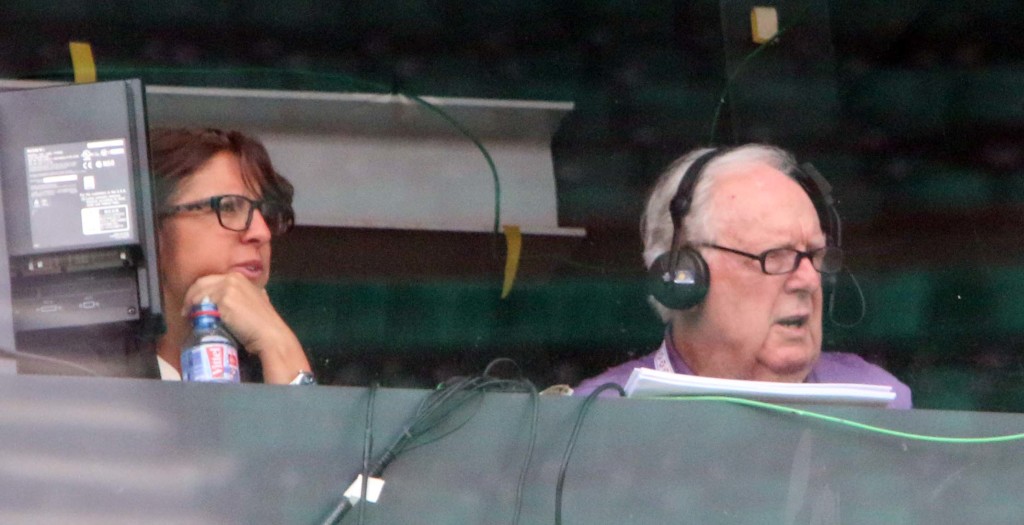
John Martin/World Tennis Gazette
FRENCH OPEN PARTNERS: Sophie Amiach chats with Fred Stolle in broadcast booth above Chatrier Court during 2015 French Open. On tour in 1980s, Amiach said, she sold her automobile to finance tournament trips to Australia, Argentina, and the United States.
By JOHN MARTIN
PARIS — Fifty years ago this spring, Fred Stolle of Australia won the French International Tennis Championship by defeating his countryman Tony Roche in the final.
Stolle and Roy Emerson, another Aussie, won the doubles crown as well.
For capturing both titles, Stolle’s total purse — if it can be called one — was a modest sum.
“Six hundred francs,” he said last week, referring to the 1965 equivalent of about $100. Soon it was gone. “Took the boys to the Lido that night, got drunk,” he said.
Asked how he could live on 600 francs, Stolle quipped: “I didn’t; I drank it.”
In late May, as he gazed down on Philippe Chatrier Court from a television commentary booth, Stolle sat amid a long-simmering debate over fair compensation for players, especially those outside the top 100.
Late last year, a major international study concluded that players must earn a minimum of $160,000 a year in prize money merely to break even (factoring in salaries and travel expenses for their coaches).
Of more than 2,000 active players, fewer than 250 men and women earn the minimum, according to two Australian researchers.
Now, however, the prize money gap is narrowing. Organizers of the Grand Slam tournaments have boosted purses significantly.
At the 2015 French Open, Irina Falconi of the United States, ranked 85th in the world, earned $94,500 for losing in the third round at Roland Garros.
“I think anytime you’re getting close to six figures, you’re doing pretty well,” she told reporters. “Once I get my check, I’m actually going to give it to my financial adviser and not even look at.”
Falconi, 25, joked that had she gone on to win the singles crown, her prize of $2 million would have enabled her to buy the Paris apartment she had rented for $165 per night.
The rising payouts were received with a touch of wistfulness by one retired player.
“They won the battle, which we fought for, what, 20, 30 years ago,” said Sophie Amiach, 51, a top French player who competed for nearly 15 years. In 1984, she earned $10,000 by reaching the quarterfinals of the Australian Open, where she lost to Chris Evert.
A few years later, searching for money to cover a trip to tournaments in Argentina, Australia and the United States, Amiach made a drastic decision.
“I sold my car,” she said, “$7,000 or $8,000 just to be able to go.”
Still later, recovering from a serious foot injury, she accepted an invitation from Billie Jean King to train in Chicago, where she shared a studio apartment with a friend.
“I was like poor as poor can be,” Amiach said. “I was just scratching to make ends meet.”
Now she earns a living as a travel and wine consultant and as a French Open television commentator who regularly shares the elevision booth with Stolle.
Amiach declined to criticize the vast prize earnings by top players even while mentioning a report that Novak Djokovic’s career earnings were nearing $80 million. These large sums demonstrate the sport’s enduring importance to millions of tennis spectators, she said.
Asked if the money matters to leading competitors, Amiach said, “I think when you pass the bar — $78 million, for Novak Djokovic, in prize money — they’re not playing for the money anymore.
But hundreds of players outside the top 100 still are playing for the cash to make ends meet.
Marius Copil, 24, of Romania, who is ranked 202nd, offered a solution.
“I think maybe the players that are in the Grand Slam already in the main draw, they should have $50,000 for the first-round loss,” he said.
A startling suggestion, perhaps, and one that would have benefited Copil in January at the Australian Open, where he qualified for the main draw and lost to Stan Wawrinka in the second round, earning nearly $39,000.
“You need that money to be safe for a year,” he said. Last month, Copil lost in the final qualifying round at Roland Garros, earning a modest $13,300.
With the $50,000 first-round paycheck at all four championships, he said, “You can hire a coach, pay their expenses, and you can say that you can travel one year.” He smiled and described an added benefit.
“This can improve your game and let you be a little bit loose on the court,” he said.
On a budget, he insisted, that would not be so tight.